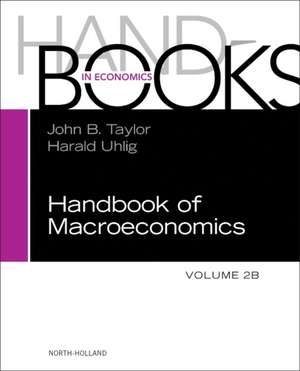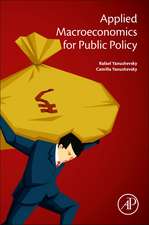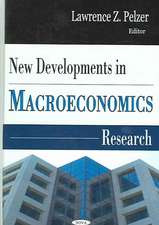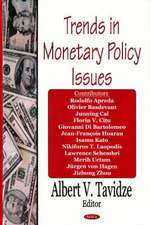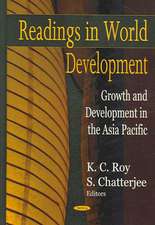Handbook of Macroeconomics: Handbook of Macroeconomics, cartea 2B
Editat de John B. Taylor, Harald Uhligen Limba Engleză Hardback – 22 noi 2016
With contributions from the world's chief macroeconomists, its reevaluation of macroeconomic scholarship and speculation on its future constitute an investment worth making.
- Serves a double role as a textbook for macroeconomics courses and as a gateway for students to the latest research
- Acts as a one-of-a-kind resource as no major collections of macroeconomic essays have been published in the last decade
| Toate formatele și edițiile | Preț | Express |
|---|---|---|
| Hardback (3) | 642.16 lei 15-29 zile | +114.30 lei 6-12 zile |
| ELSEVIER SCIENCE – 22 noi 2016 | 642.16 lei 15-29 zile | +114.30 lei 6-12 zile |
| ELSEVIER SCIENCE – 21 noi 2016 | 642.68 lei 15-29 zile | |
| ELSEVIER SCIENCE – 22 noi 2016 | 1265.57 lei 15-29 zile |
Preț: 642.16 lei
Preț vechi: 816.64 lei
-21% Nou
Puncte Express: 963
Preț estimativ în valută:
122.89€ • 127.83$ • 101.46£
122.89€ • 127.83$ • 101.46£
Carte disponibilă
Livrare economică 17-31 martie
Livrare express 08-14 martie pentru 124.29 lei
Preluare comenzi: 021 569.72.76
Specificații
ISBN-13: 9780444594662
ISBN-10: 0444594663
Pagini: 1376
Dimensiuni: 191 x 235 x 56 mm
Greutate: 2.29 kg
Editura: ELSEVIER SCIENCE
Seria Handbook of Macroeconomics
ISBN-10: 0444594663
Pagini: 1376
Dimensiuni: 191 x 235 x 56 mm
Greutate: 2.29 kg
Editura: ELSEVIER SCIENCE
Seria Handbook of Macroeconomics
Public țintă
Graduate students and professors worldwide working in all subdisciplines of economics and finance. Secondary audience will include researchers working in macroeconomics and related areas, such as growth, economic behavior, international economics, and modeling.Cuprins
Section 3: Financial-Real Connections
17. Wholesale Banking and Bank Runs in Macroeconomic Modelling of Financial Crises
18. Housing and Credit Markets: Bubbles and Crashes
19. Macro, Money and Finance: A Continuous-Time Approach
20. Housing and Macroeconomics
21. Term Structure of Uncertainty in the Macroeconomy
22. Quantitative Models of Sovereign Debt Crises
Section 4: Models of Economic Growth and Fluctuations
23. Families in Macroeconomics
24. Environmental Macroeconomics
25. The Staying Power of Staggered Wage and Price Setting Models in Macroeconomics
26. Neoclassical Models in Macroeconomics
27. Macroeconomics of Persistent Slumps
28. Macroeconomics and the Labor Market
Section 5: Macroeconomic Policy
29. Challenges for Central BanksMacro Models
30. Liquidity requirements, liquidity choice and financial stability
31. Understanding Inflation as a Joint Monetary-Fiscal Phenomenon
32. Fiscal Multipliers: Liquidity Traps and Currency Unions
33. What Is a Sustainable Public Debt?
34. The Political Economy of Government Debt
17. Wholesale Banking and Bank Runs in Macroeconomic Modelling of Financial Crises
18. Housing and Credit Markets: Bubbles and Crashes
19. Macro, Money and Finance: A Continuous-Time Approach
20. Housing and Macroeconomics
21. Term Structure of Uncertainty in the Macroeconomy
22. Quantitative Models of Sovereign Debt Crises
Section 4: Models of Economic Growth and Fluctuations
23. Families in Macroeconomics
24. Environmental Macroeconomics
25. The Staying Power of Staggered Wage and Price Setting Models in Macroeconomics
26. Neoclassical Models in Macroeconomics
27. Macroeconomics of Persistent Slumps
28. Macroeconomics and the Labor Market
Section 5: Macroeconomic Policy
29. Challenges for Central BanksMacro Models
30. Liquidity requirements, liquidity choice and financial stability
31. Understanding Inflation as a Joint Monetary-Fiscal Phenomenon
32. Fiscal Multipliers: Liquidity Traps and Currency Unions
33. What Is a Sustainable Public Debt?
34. The Political Economy of Government Debt
Recenzii
"Macro is moving fast, partly because of technological progress and new data, partly because of the intellectual shocks triggered by the crisis. This handbook, like its predecessors, gives us the current state of the arts." --Olivier Blanchard, Massachusetts Institute of Technology
"The new volumes in the Handbook of Macroeconomics illustrates both the richness and the enormous breadth of modern research in macroeconomics. The chapters offer in depth surveys of critical areas, new empirical results to guide future researchers, analytical and computational tools for addressing macroeconomic issues, and examples of how these tools can be applied to advance our understanding of aggregate economic behavior. These volumes constitute an important resource for all macroeconomists, one that is certain to be widely used." --Carl E. Walsh, University of California, Santa Cruz
"This Handbook is the ideal starting point to get up to speed quickly on any major topic in Macroeconomics: What we have learned and what are the most pressing open questions." --Pete Klenow, Stanford University
"The new volumes in the Handbook of Macroeconomics illustrates both the richness and the enormous breadth of modern research in macroeconomics. The chapters offer in depth surveys of critical areas, new empirical results to guide future researchers, analytical and computational tools for addressing macroeconomic issues, and examples of how these tools can be applied to advance our understanding of aggregate economic behavior. These volumes constitute an important resource for all macroeconomists, one that is certain to be widely used." --Carl E. Walsh, University of California, Santa Cruz
"This Handbook is the ideal starting point to get up to speed quickly on any major topic in Macroeconomics: What we have learned and what are the most pressing open questions." --Pete Klenow, Stanford University
